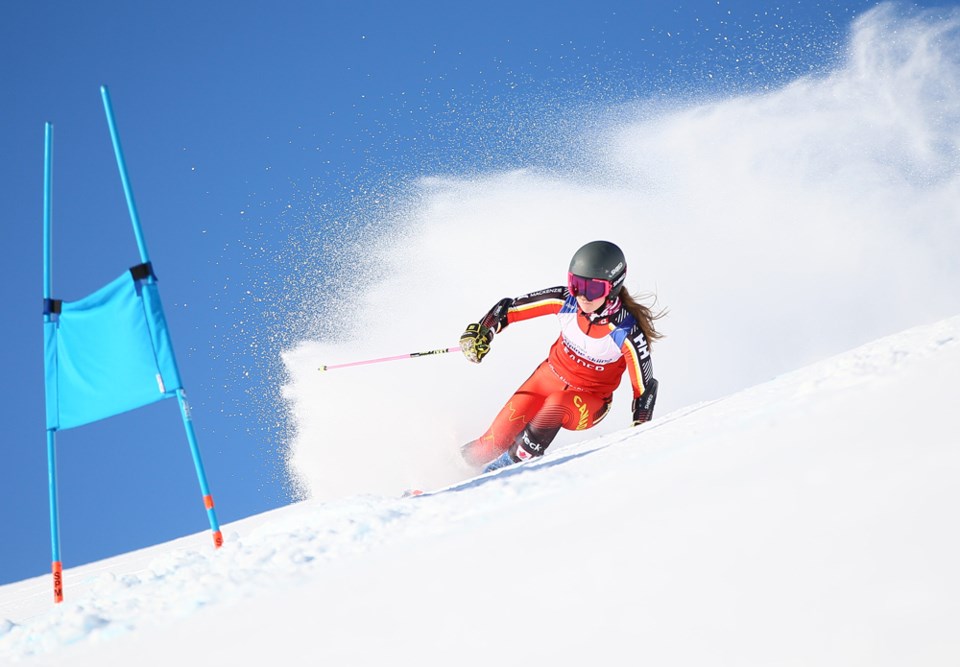For the second time in a row, West Vancouver’s Mollie Jepsen has the honour of winning Canada’s first medal at the Paralympic Games.
This time it was a golden start to the Games, but it didn’t come easily.
As she crouched in the start gate for the women’s standing downhill on Saturday, Jepsen knew her four years of Paralympic preparation had not gone nearly as planned.
After capturing four medals in a stunning Paralympic debut in 2018 in Pyeongchang, Crohn's disease sidelined her for all of the following season, saw her in and out of hospital and robbed her of precious muscle strength.
And then finally in remission, the COVID-19 pandemic struck, grounding Canada's Para ski team for the better part of two seasons.
But the 22-year-old saw the silver linings in her forced break, and turned them into gold on Saturday, racing to both Canada's first medal and victory of the Beijing Paralympics.
"Being able to spend a lot of time training at home was actually hugely beneficial," Jepsen said of the past two years. "I've raced a lot in my life because I was racing able-bodied before I went onto the Para circuit, and so I felt comfortable taking a step back, and training in the pandemic allowed us to go very far back to basics.
"I think on race day, it was all that trust and confidence in yourself, knowing that you've really put in the work. I saw a lot of great silver linings in what's happened ... and came out a lot better and stronger."
Jepsen's gold was the first of three medals for Canada on Day 1 of the Games. Mac Marcoux of Sault Ste. Marie, Ont., captured silver in the men's downhill, while Mark Arendz of Hartsville, P.E.I., opened his busy Paralympics with a bronze in the men's 6-kilometre biathlon.
Jepsen recorded a time of one minute 21.75 seconds on the Yangqing Alpine Centre course. China's Zhang Mengqiu took silver and Sweden's Ebba Aarsjoe earned bronze.
“I think until December of 2021, I really had no idea how I was skiing and how I was going to stack up against the rest of the girls,” stated Jepsen in a release. “I was confident in the team and the way we had been handling COVID and training, but until a couple months ago I really had no idea. Once I knew in December, I could really build my confidence until now and it feels really amazing to know my best skiing is capable on standing on top of the podium. I don’t think it’s really set in yet, but I’ve grown a lot over the last four years and to stand on top of the podium in the first race feels amazing.”
Jepsen followed up her golden performance in downhill with a sixth-place showing in Super-G on Day 2 at the Paralympics.
The four-foot-eight Jepsen, who was born missing three fingers on her left hand, began skiing with her family at age two, but it's been a rocky career. She broke a wrist as a child, and then tore the anterior cruciate ligament twice in her left knee as a teenager.
The Canadian team was in Norway when the pandemic struck in early 2020. The skiers were sent home. It would be months before they'd be back on snow training. Jepsen set up a gym in her family's home in Whistler, B.C. She and her teammates didn't compete again until this season.
The emergence of Omicron a few weeks ago had Jepsen and the rest of Canada's Paralympic athletes worried they'd even get to the starting line.
"Honestly, (I said) if we get there as a team, safe and healthy, that's a win in itself, and touring around the village together the first day we got here, and to be here as a team and healthy and be together is just an amazing feeling. Everything else is just the icing on the cake right now," she said.
Jepsen is competing in Beijing wearing a new helmet featuring a design by Squamish Nation artist Xwalacktun (Rick Harry).
- with files from Andy Prest, North Shore News



